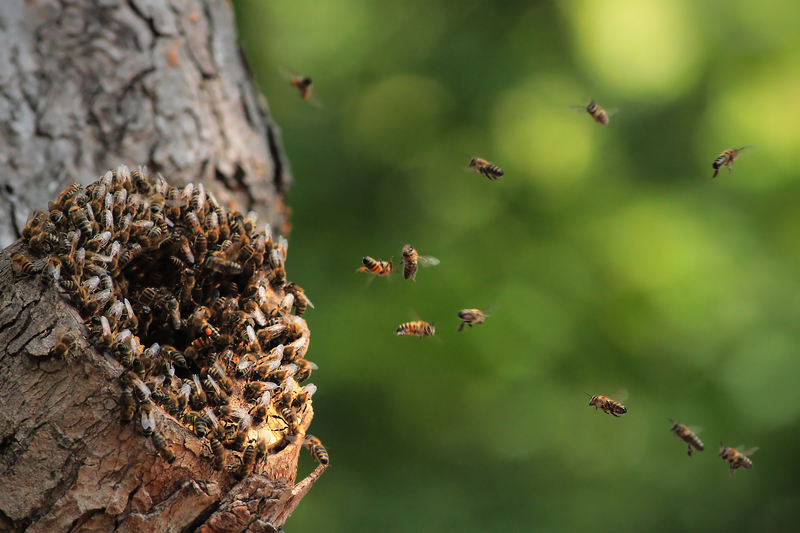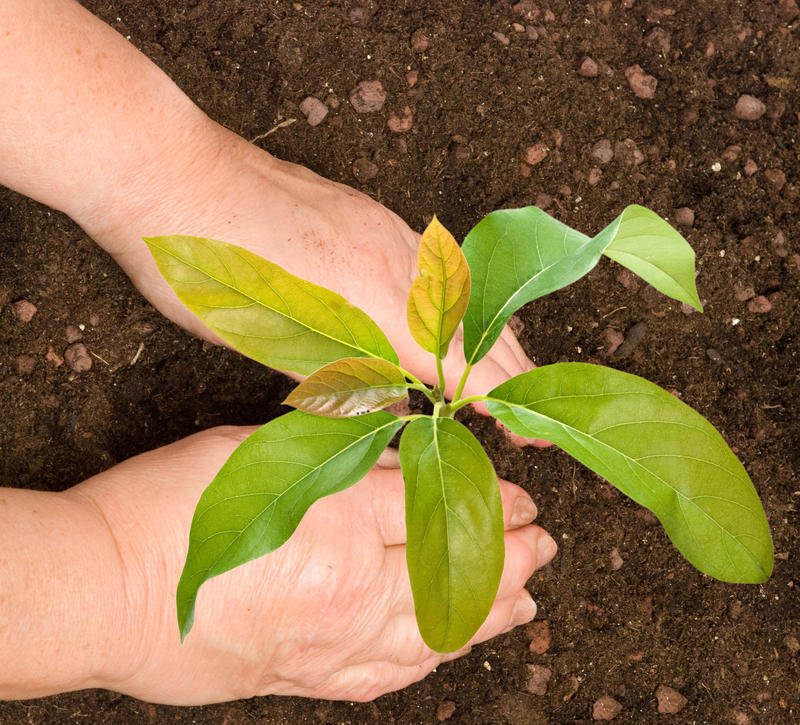Turning Waste into Eco-Gold with Soil-Enriching Methods
Posted on 23/09/2025
Turning Waste into Eco-Gold with Soil-Enriching Methods
In a world increasingly beset by environmental challenges, the urgent call to action lies not only in reducing our waste but also in discovering innovative ways to transform it into valuable resources. Turning waste into eco-gold is more than just an aspirational phrase--it encapsulates the power of repurposing organic and inorganic waste streams into invaluable tools for soil enrichment and sustainable agriculture. In this comprehensive guide, we explore soil-enriching methods that convert everyday waste into essential nutrients for the earth, offering hope for a cleaner environment and a more robust food supply.

Why Turn Waste into Soil Gold?
Most people view waste as an end point--a problem to be managed rather than an opportunity to be seized. However, transforming waste into eco-gold through clever, environmentally-aware methods fuels the cycle of regeneration. It conserves resources, reduces landfill use, lowers greenhouse gas emissions, and improves soil vitality. By leveraging innovative soil-enriching techniques, even the humblest banana peel or coffee ground can play a surprisingly heroic role in improving garden beds, farms, and landscapes.
Understanding Waste-to-Eco-Gold Soil-Enriching Methods
The journey from refuse to rich, productive soil hinges on understanding the different types of waste and the wide spectrum of eco-friendly solutions available. Soil-enriching methods aim to transform waste--organic or otherwise--into substances that improve soil health, structure, and fertility. Below are some of the leading approaches in this eco-conscious revolution.
1. Composting: Nature's Original Alchemy
Composting is perhaps the oldest and most accessible method of turning kitchen and yard waste into soil eco-gold. The process relies on the natural decomposition of materials such as fruit peels, vegetable scraps, leaves, coffee grounds, eggshells, and even paper products.
- How It Works: Microorganisms such as bacteria and fungi break down organic matter under controlled conditions of moisture and aeration.
- The Result: A dark, crumbly, nutrient-rich substance--compost--that acts as a powerful soil conditioner.
Compost enriches soil by:
- Boosting Nutrient Content: Providing essential nutrients (nitrogen, phosphorus, potassium) for robust plant growth.
- Enhancing Structure: Improving soil porosity and water retention, preventing erosion and runoff.
- Encouraging Beneficial Life: Increasing populations of earthworms and friendly microbes.
2. Vermicomposting: Harnessing the Power of Worms
An extension of traditional composting, vermicomposting uses earthworms--primarily Eisenia fetida (commonly known as red wigglers)--to break down waste into an exceptionally potent soil amendment.
- Why It's Eco-Gold: Worm castings (vermicompost) are teeming with beneficial microbes and nutrients. Studies show they significantly improve seed germination, plant growth, and crop yields.
- Sustainability Perk: Vermicomposting is scalable--from small indoor bins to larger commercial setups--making it suitable for households, schools, and communities aiming to reduce organic waste output.
3. Bokashi Composting: Fermentation for Faster Results
Originating from Japan, Bokashi composting involves fermenting kitchen waste with the help of special microbial inoculants--typically a mix of friendly bacteria and yeasts.
- What Sets It Apart: It can process meat, dairy, and even some cooked foods, which are traditionally problematic for standard compost bins.
- Speed & Space: Bokashi is fast, odor-free, and well-suited for urban environments and apartments.
- Soil Benefits: The fermented waste (Bokashi "pre-compost") is buried in soil, where it quickly breaks down and fertilizes plants.
4. Biochar: Turning Woody Waste into Black Gold
Produced by heating plant materials (such as wood chips or agricultural byproducts) in a low-oxygen environment--a process known as pyrolysis--biochar is a form of charcoal with extraordinary soil-amending capabilities.
- Soil Enrichment: Biochar enhances soil fertility, increases water retention, and creates habitats for beneficial microbes.
- Eco-Gold Potential: It sequesters carbon for hundreds to thousands of years, drastically reducing greenhouse gas emissions.
- Best Uses: Sandy soils, degraded lands, and areas prone to drought.
5. Manure Management: Agricultural Waste Reborn
Livestock manure--when managed responsibly--can be converted from a pollution concern into a potent soil amendment. Methods like composted manure, anaerobic digestion, or biogas systems provide pathways for safe and productive use.
- Key Benefits: High levels of organic matter and nutrients, enhanced soil microbe activity, and improved soil structure.
- Precautions: Always compost or age raw manure to destroy pathogens and weed seeds before application.
6. Mulching: Recycling Plant Waste for Soil Wellness
Instead of disposing of yard trimmings, leaves, or grass clippings, they can be shredded and laid directly on top of soil as mulch. This classic waste-to-eco-gold method offers multiple benefits:
- Moisture Retention: Mulch keeps soil cool and moist, reducing irrigation needs.
- Weed Suppression: A thick layer of organic mulch inhibits weed growth.
- Slow Release Fertility: As it decomposes, mulch feeds the soil with slow-release nutrients.
Turning Waste Streams into Soil-Enriching Resources
Successfully turning waste into eco-gold begins by identifying the types of waste you naturally generate at home, in schools, or on farms. Here's how to harness the most common waste streams into effective soil amendments:
1. Kitchen Scraps
- Fruits, vegetables, coffee grounds, eggshells: Compost or vermicompost.
- Cooked leftovers, dairy, meat: Try Bokashi or industrial composting.
2. Yard and Garden Debris
- Leaves, grass clippings, woody branches: Compost, mulch, or biochar production.
- Flower prunings, weeds (before seeding): Hot compost or solarize to kill weed seeds.
3. Agricultural Residues
- Crop stalks, chaff, animal manure: Compost with carbon-rich materials, or process with biochar.
4. Paper and Cardboard
- Shred and add to compost as "brown" (carbon) material.
- Sheet mulching: Layer cardboard under mulch to suppress weeds.
The Science Behind Soil Enrichment & Waste Recycling
Unlocking the full power of eco-gold soil amendments depends on an appreciation for the biological and chemical processes involved:
- Microbial Action: Bacteria, fungi, protozoa, and earthworms transform raw waste into humus--the heart of healthy soil.
- Carbon-to-Nitrogen Ratio: Compost piles thrive when "greens" (nitrogen, moist materials) are balanced with "browns" (carbon, dry materials).
- Humification: The end goal; stable organic matter that resists decomposition and enhances soil structure for the long term.
Properly applied waste-to-soil-enriching techniques lead to:
- Soil Resilience: Increased water holding capacity helps plants survive drought and extreme weather.
- Improved Plant Health: Balanced nutrition boosts plant immunity, root development, and crop productivity.
- Carbon Sequestration: Transforms waste into stable soil organic matter, mitigating climate change.
Soil Enrichment Success Stories Around the World
Communities worldwide are successfully turning waste into eco-gold through innovative local projects and grassroots movements. Here are just a few:
- Kibera, Kenya: Urban farmers use composting toilets and organic waste recycling to grow nutritious vegetables in minimal space.
- San Francisco, USA: A citywide composting program diverts thousands of tons of food waste from landfill, producing rich compost for vineyards and public parks.
- India: Rural collectives compost kitchen waste and crop residues to reclaim degraded soils, rejuvenate farmlands, and support sustainable livelihoods.
Step-by-Step Guide: Launching Your Own Eco-Gold Soil Project
Interested in transforming your household or community waste into valuable soil enrichers? Follow these simple yet effective steps:
- Assess Your Waste: Track your daily, weekly, or monthly waste output. Classify it as kitchen, garden, paper, or miscellaneous waste.
- Select an Appropriate Technique: Choose composting, vermicomposting, Bokashi, or biochar based on your space, time, and waste profile.
- Establish a Collection System: Set up clearly labeled bins for organic and compostable materials. Ensure regular emptying and maintenance.
- Process the Waste: Follow best practices for your chosen method, paying attention to moisture, aeration, and temperature.
- Harvest and Apply the Eco-Gold: Once matured, spread your compost, vermicompost, or biochar as a top-dressing, soil amendment, or garden mulch.
- Monitor Results: Observe improvements in soil texture, water retention, and plant health. Adjust your technique as needed for continuous improvement.
Challenges and How to Overcome Them
While turning waste into eco-gold offers immense ecological and financial benefits, certain hurdles can arise:
- Contamination: Mixing plastics, metals, or non-compostable waste can introduce toxins. Solution: Educate and enforce clean-waste sorting rules.
- Odor or Pests: Poorly managed compost attracts rodents and flies. Solution: Maintain correct green/brown ratio and aerate regularly.
- Limited Space: Urban dwellers may lack yard space. Solution: Use compact systems like Bokashi, worm bins, or community composting hubs.
- Time and Patience: Soil building is a gradual process. Solution: Start small and build momentum. Involve friends, schools, or neighbors for faster, scalable results.
Advanced Approaches: Bringing Innovation to Waste-Based Soil Enrichment
Cutting-edge research and technology now allow for even more effective recycling and enrichment processes, such as:
- Microbial Inoculants: Adding specialized microbes or mycorrhizal fungi to speed up organic matter breakdown and increase nutrient uptake.
- Biofertilizer Production: Converting food processing industry waste into liquid nutrients for large-scale farming.
- Green Roofs and Living Walls: Utilizing compost and recycled materials to create urban green spaces that reduce pollution and heat.

The Environmental & Economic Payoff
By transforming waste into soil-enriching eco-gold, communities can achieve profound environmental and economic gains:
- Reduced Landfill Pressure: Less organic waste means slower landfill fill-up and reduced methane emissions.
- Lower Fertilizer Costs: Homemade compost or amended soils reduce the need for chemical fertilizers, saving money and preventing pollution.
- Sustainable Agriculture: Healthier soils support better yields, stronger plants, and improved food security.
Conclusion: From Waste to Worth--Be Part of the Eco-Gold Movement
The vision of a world where waste is regularly turned into eco-gold isn't merely a dream--it's a practical reality unfolding in gardens, farms, and communities everywhere. By harnessing soil-enriching methods like composting, vermicomposting, biochar, and innovative recycling techniques, we rejuvenate not only our soils but also our relationship with nature.
If you're ready to get started, every leftover peel, grass clipping, or cardboard box presents an opportunity to enrich the earth--and, in the process, build a greener, more sustainable future for all. Embrace the transformation. Become a steward of the soil and a champion of change--turn waste into eco-gold today!
```Latest Posts
Container Gardening: A Plant Lover's Ideal Solution
Garden Armor: How to Winterize Plants
Turning Waste into Eco-Gold with Soil-Enriching Methods

